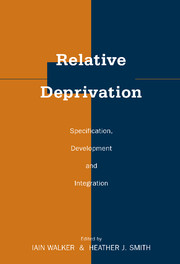Book contents
- Frontmatter
- Contents
- List of Contributors
- 1 Fifty Years of Relative Deprivation Research
- PART ONE SPECIFICATION
- PART TWO DEVELOPMENT
- PART THREE INTEGRATION
- 11 Social Identity and Relative Deprivation
- 12 Relative Deprivation and Counterfactual Thinking
- 13 Relative Deprivation and Attribution: From Grievance to Action
- 14 Spontaneous Temporal and Social Comparisons in Children's Conflict Narratives
- 15 Prejudice as Intergroup Emotion: Integrating Relative Deprivation and Social Comparison Explanations of Prejudice
- Part Four Conclusion
- Index
15 - Prejudice as Intergroup Emotion: Integrating Relative Deprivation and Social Comparison Explanations of Prejudice
Published online by Cambridge University Press: 29 September 2009
- Frontmatter
- Contents
- List of Contributors
- 1 Fifty Years of Relative Deprivation Research
- PART ONE SPECIFICATION
- PART TWO DEVELOPMENT
- PART THREE INTEGRATION
- 11 Social Identity and Relative Deprivation
- 12 Relative Deprivation and Counterfactual Thinking
- 13 Relative Deprivation and Attribution: From Grievance to Action
- 14 Spontaneous Temporal and Social Comparisons in Children's Conflict Narratives
- 15 Prejudice as Intergroup Emotion: Integrating Relative Deprivation and Social Comparison Explanations of Prejudice
- Part Four Conclusion
- Index
Summary
Since the term relative deprivation was coined by Stouffer in 1949, research on relative deprivation has progressed in many directions. One trend in recent research has been the application of relative deprivation concepts to the study of prejudice and intergroup relations. For example, relative deprivation concepts have been used to understand minority group members' emotional and behavioral reaction to perceived discrimination (Dion, 1986), and to understand when minority and subordinate groups will respond to their disadvantaged positions with political protest or violence (Dube & Guimond, 1986). These studies have typically examined a group (or fraternal) type of deprivation, as opposed to a personal (individual) type of deprivation (Abeles, 1976; Martin, 1981; Runciman, 1966). Closely associated with group deprivation, the concept of intergroup comparison has also been used to explain prejudice and intergroup relations (Goethals & Darley, 1987; Levine & Moreland, 1987; Tajfel & Turner, 1986). Tajfel and Turner's (1986) social identity theory, for example, assumes that people are motivated to maintain or enhance self-esteem through comparison, or the avoidance of comparison, with various other groups.
The primary purpose of this chapter is to describe Smith's (1993) conceptual framework of prejudice and to show that this conceptualization links both group relative deprivation and intergroup social comparisons to intergroup prejudice. After presenting an overview of Smith's (1993) model, we illustrate its utility by applying it to explaining prejudice toward Asian Americans.
- Type
- Chapter
- Information
- Relative DeprivationSpecification, Development, and Integration, pp. 332 - 348Publisher: Cambridge University PressPrint publication year: 2001
- 4
- Cited by



